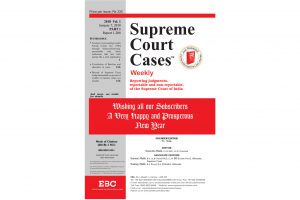SCC Issue dated February 14th, 2021 (Vol. 2 Part 1)
Read the decisive judgment of the three-Judge Bench in the Vidya Drolia case, dexterously analysed by our Editors in over 21 short notes. The Judgment expounds on what is arbitrable and what is not. It propounds a fourfold test for determining when claim(s) in or subject-matter of a dispute are not arbitrable; and considers non-arbitrability of various kinds of claims or subject-matter based on this fourfold test.[Vidya Drolia v. Durga Trading Corpn., (2021) 2 SCC 1]
Short Notes: 21
Arbitration and Conciliation Act, 1996 — Ss. 8 & 11 and Ss. 2(3) & 34(2)(b)(i) — Non-arbitrability — Meaning of, explained and discussed in detail: Arbitration being a matter of contract, the parties are entitled to fix boundaries so as to confer and limit jurisdiction and legal authority of arbitrator and though the arbitration agreement may be valid, yet Arbitral Tribunal, in view of the will of the parties expressed in arbitration agreement, may not have jurisdiction to adjudicate the dispute. There is a difference between a non-arbitrable claim and non-arbitrable subject-matter: the former may arise on account of scope of the arbitration agreement and also when the claim is not capable of being resolved through arbitration; while generally non-arbitrability of the subject-matter would relate to non-arbitrability in law. Though the A&C Act, 1996 recognises and accepts that certain disputes or subjects are not capable of being resolved by arbitration vide S. 2(3) and S. 34(2)(b)(i), it is left to the courts ex visceribus actus i.e. from the very essence of the Act and within its four corners, to formulate the principles for determining non-arbitrability. Exclusion from arbitrability is predominantly a matter of case law. Propounding a fourfold test, held, that the subject-matter of a dispute in an arbitration agreement is not arbitrable when: (1) the cause of action and subject-matter of the dispute relates to actions in rem, that do not pertain to subordinate rights in personam that arise from rights in rem; (2) the cause of action and subject-matter of the dispute affects third-party rights, have erga omnes effect i.e. where rights or obligations are owed towards all, require centralised adjudication, and mutual adjudication would not be appropriate and enforceable; (3) the cause of action and subject-matter of the dispute relates to inalienable sovereign and public interest functions of the State and hence mutual adjudication would be unenforceable; (4) the subject-matter of the dispute is expressly or by necessary implication non-arbitrable as per mandatory statute(s). The aforesaid fourfold test has to be applied with care and caution. These tests are not watertight compartments: they dovetail and overlap, albeit when applied holistically and pragmatically, will help and assist in determining and ascertaining with great degree of certainty when as per law in India, a dispute or subject-matter is non-arbitrable. Only when the answer is in the affirmative that the subject-matter of the dispute would be non-arbitrable. [Vidya Drolia v. Durga Trading Corpn., (2021) 2 SCC 1]
Expanding Horizons of Criminal Procedure Law: Criminal Procedure law is treated merely as a lawyer’s law that tends to remain grossly marginalised in the law schools and training institutes. In this article the author had suggested ways and means for enhancing the understanding and devising new pedagogies of teaching criminal procedure law in the light of growing trends of transformations in the nature and curricular content of criminal procedure courses, highlighting the core criminal procedure issues in the light of lead readings on the subject and underscore a few notable High Court and the Supreme Court rulings that have the potential of maturing into a model procedure law for the future. [Expanding Horizons of Criminal Procedure Law by Prof. B.B. Pande, (2021) 2 SCC (J-1)]

